6+ SAMPLE Client and Developer Agreement
-
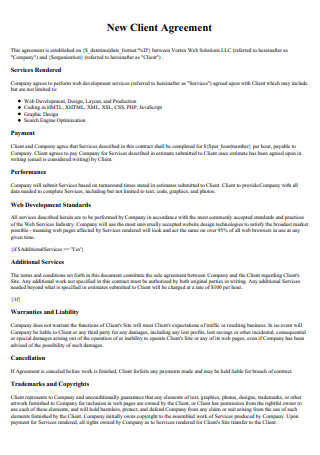
New Client and Developer Agreement
download now -
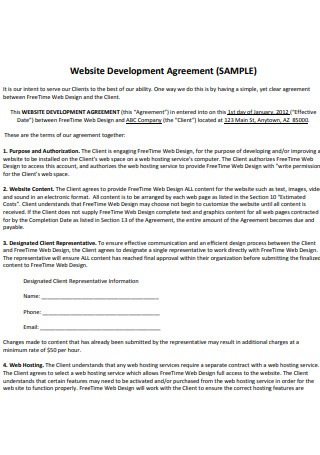
Client and Web Developer Agreement
download now -
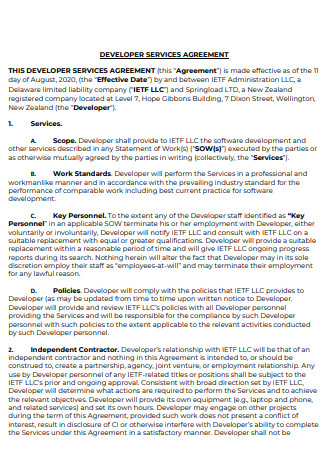
Client and Developer Services Agreement
download now -
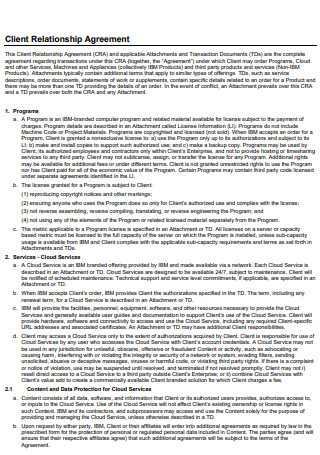
Client and Developer Relationship Agreement
download now -
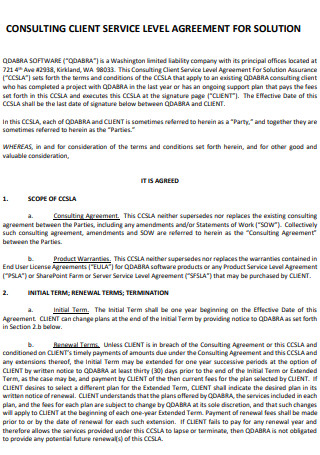
Sample Client and Developer Agreement
download now -
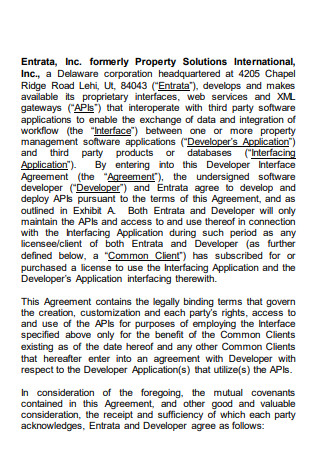
Client and API Developer Agreement
download now -
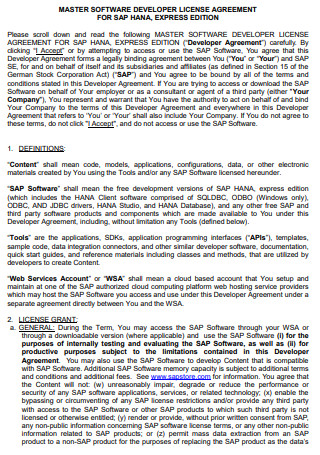
Simple Client and Developer Agreement
download now
FREE Client and Developer Agreement s to Download
6+ SAMPLE Client and Developer Agreement
What Is a Client and Developer Agreement?
Advantages of Hiring a Software Developer
How to Write a Client and Developer Agreement
FAQs
What are the benefits of software licensing?
What is the scope of work?
What is the purpose of a client agreement?
What Is a Client and Developer Agreement?
A client and developer agreement outlines the terms under which a developer sells and transmits customized software to a client who will use it in their products, services, or processes. The scope of work, also known as a statement of work, is typically added to the agreement as an appendix, exhibit, or rider to specifically characterize what software is to be developed under the agreement. Make sure that you have thoroughly reviewed the software development agreement with the client before sending it to them. You can check out the Software Developer Agreement template available for you to use as a reference.
Advantages of Hiring a Software Developer
Clients may not be convinced to hire a Software Developer to carry out their respective needs. Alternatively, if you know a client who is interested but needs further persuasion, you can use this list as a factor to tell them. There are various benefits that they may not be aware of which is why you need to be able to explain the ease of hiring a team than them doing it all on their own. An agreement between a web developer and client will then be discussed after they believe the advantages. Read this curated list to learn more about the said advantages.
How to Write a Client and Developer Agreement
This is the part of the article where you can finally draft out the agreement between software developer and client. Thoroughly review the steps so that you can ensure that no relevant detail is forgotten so that once you hand it over to the client, there are little to no necessary revisions done on the agreement. If you are new to this process, then you may need to view the freelance software developer contract template provided for you. Additionally, make use of the template as you go over the steps as they can guide you through it.
-
1. Information of Both Parties
A written contract must explicitly identify who is legally obligated by the agreement to be legally binding. In other words, you will need contact information for all parties involved. Every contract should include the legal business name, main contact, physical address, billing address, and contact details for both the client and the contractor or business owner. Make sure you enter your legal company name, down to the spelling and hyphen. Throughout the document, continue to use both your company and your client’s names. Leaving generic terms in the agreement will make it sound significantly more impersonal which isn’t a legal issue, but could put off some clients.
-
2. Specify Project Terms and Scope
Agreements, as previously stated, are all about laying out the fine print of your Document. It’s critical to be as precise as possible about what you have been hired to accomplish, how you will execute it, and what both parties expectations are. This is the section where you will need to specify the scope of the project as well as the responsibilities of each of the team of developers. There could be times when the team is responsible for redesigning the layout or also include writing the copy and sourcing images. Stating the times of revisions included as well as the additional charges for another round of edits.
-
3. Establish Payment Terms
This is the section where you will identify the method of payment, billing or payment schedule, and the minimum and maximum working hours of the team dedicated to developing the software. Even if your customer reduces the project’s scope, you will be compensated for the time you set aside for it. It will help prevent scope creep and ensure that you are fairly compensated if your customer decides to assign you additional work. If you are being paid by the project, it’s crucial to spell out the deliverables you will be responsible for as well as what the project rate covers to avoid scope creep.
-
4. Set the Schedule
You will also want to clearly outline any project deadlines, such as project milestones and final deliverables, in addition to billing and payment schedules. If the client is required to provide anything for the project, be sure to specify exactly what you require and when you require it. After receiving your invoice, the payment schedule specifies how long the client has to pay you. You will also need to spell out any consequences the client will face if they don’t stick to the payment schedule, such as a late-charging fee. Inform the client on the growth or rate of percentage of the late fee. Schedules are important so that your Team and your client can determine the speed of the development.
-
5. Termination Terms
Projects don’t always go as planned, but if your client cancels the project, you will want to make sure your company or team is protected and compensated. It will assist you to avoid putting in a lot of time and effort only to have the client cancel the job and refuse to pay you. Everyone in the industry knows that planning and developing software is stressful. So to include the terms of termination will ensure your efforts don’t go to waste. You can also include language that states that if the project is delayed for an extended period, you will be invoiced for all work completed up to that point, and that Invoice must be paid according to the agreement’s payment terms.
-
6. Consider Adding an Arbitration Clause
If there are any disagreements about the agreement, a neutral third party will hear both parties’ evidence and make a decision. It’s usually faster, simpler, and easier to schedule than courtroom litigation, albeit it’s not always cheaper. It can also be less adversarial and more private than going to court. Consider inserting an arbitration clause in your agreement if you believe this is the way of dispute resolution you prefer. It’s worth noting that even if your agreement doesn’t include an arbitration clause, you and your client can still choose to use an arbitrator if you both agree.
FAQs
What are the benefits of software licensing?
A software license is a legally binding agreement that spells out how to use and distribute software. The right to produce one or more versions without infringing on copyrights is normally granted to end-users. The three Ps of licensing: portability, piracy, and profitability are some of the benefits of software licensing. Software licensing offers a lot of freedom and portability, letting your consumers use your product whenever and wherever they want. Another benefit is the prevention of piracy which will be beneficial to most companies utilizing software and Websites as dealing with piracy is a strenuous effort to correct.
What is the scope of work?
The scope of work can help the software developer understand what is expected of him or her. This implies it’s critical to spell out exactly what will be included in the task and what will be excluded. List the exact number of hours that the job will take. Declare the exact features that a piece of software requires, which will aid in determining the scope of work’s required components. In addition, maintenance services might be worth investigating. These kinds of concerns concerning the scope of work should be addressed in the agreement between the parties. The purpose of the scope of work is so that you or your team won’t have to perform tasks that are beyond your capabilities nor pressure you to comply with the client’s requests that have not been stated in the agreement.
What is the purpose of a client agreement?
A client services agreement is a crucial legal contract that establishes the business relationship and eliminates any potential ambiguity between your company and its clients. Your client services agreement should be representative of your company. Any future arguments between your business and your clients over the terms of the arrangement may cost your business extra time and money to resolve if you do not properly document your business arrangement. Make use of the software development agreement checklist to aid you with additional details. Having an agreement for any other usage is the best scenario to protect yourself and your company while also making sure you and the client are on the same page in terms of thoughts.
You have reached the end of the article which signifies that you are more than ready to begin writing the draft for the client and developer agreement. As mentioned, you don’t have to stress or worry about starting from scratch because we have provided you with templates and samples that you can either use as references or right away edit until they will fit your preferences. The important thing is that you utilize it in a way that it can showcase your company and the client’s unique points of discussion. What are you waiting for? Start making a software development retainer agreement now!
